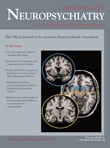Pathological Gambling Associated With Cabergoline Therapy in a Patient With a Pituitary prolactinoma.
SIR: I report the case of a 47-year-old woman with pathological gambling associated with low dose cabergoline treatment for pituitary prolactinoma.
The patient was a previously well woman with no psychiatric history and no previous history of gambling. She was diagnosed with a pituitary prolactinoma at 25 years of age after investigations for infertility and was initially successfully treated with bromocriptine. It was taken for some years and then stopped.
At 38 years of age she developed recurrent lactation, ongoing irregular menses and hyperprolactaemia. Repeat MRI confirmed a pituitary microadenoma and cabergoline was commenced at a dose of 0.25 mg weekly. Menses then became regular, galactorrhea improved and prolactin returned to within the normal range. Nausea was reported and surgical treatment offered but declined.
Approximately 1 year later she began gambling on poker machines and this behavior escalated over the next 9 years. She gambled on most days and lost approximately $700,000 in total. As her gambling increased she developed depression, paranoia, and marital difficulty. She was commenced on Alendronate sodium at the age of 46 because of osteopenia.
At the time of presentation, the diagnoses of major depression with paranoid delusions and pathological gambling were made. Her cabergoline was ceased and an antidepressant, escitalopram was commenced. Two months later her mood had improved, her paranoid delusions had resolved, and her gambling had ceased. Surgical management of her prolactinoma will now be reconsidered.
Cabergoline is a dopamine ergoline derivative which stimulates D2 receptors in the pituitary. 1 It has been proposed that pathological gambling is caused by a stimulation of dopaminergic reward systems and is linked with other addictive and obsessive behaviors. 2 Cabergoline has been associated with pathological gambling when used with L -dopa to treat Parkinson’s disease. 3
To my knowledge, this is the first report of cabergoline being associated with pathological gambling in a patient with pituitary prolactinoma. Physicians prescribing cabergoline need to be aware of the potential for the development of pathological gambling in their patients.
1 . Prescribing Information for cabergoline. eMIMS 2006.Google Scholar
2 . Schultz W. Getting formal with dopamine and reward. Neuron 2002; 36:241–263Google Scholar
3 . Avanzi M, Uber E, Bonfa F. Pathological gambling in two patients on dopamine replacement therapy for Parkinson’s disease. Neurol Sci 2004; 25:98–101Google Scholar



